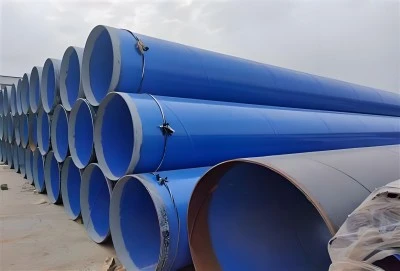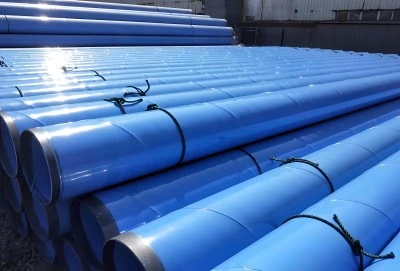Long-Term Savings with Epoxy Coated Pipes in Industrial Projects
When it comes to industrial projects, the initial cost is just one piece of the puzzle. Savvy project managers and engineers understand the importance of considering the total cost of ownership over a system's entire lifecycle. This is where epoxy coated carbon steel pipes truly shine.
The application of epoxy coating to carbon steel pipes creates a formidable barrier against corrosion, one of the primary culprits behind pipe deterioration and failure. This enhanced protection translates into a longer service life for the piping system, which in turn means fewer replacements and less frequent overhauls. The result? Significant cost savings over the long haul.
Moreover, the smooth inner surface of epoxy coated pipes reduces friction, allowing for more efficient fluid flow. This improved flow efficiency can lead to energy savings in pumping operations, further contributing to the overall cost-effectiveness of the system.
Another often-overlooked benefit is the reduced need for cathodic protection systems. While traditional carbon steel pipes often require extensive and costly cathodic protection to prevent corrosion, epoxy coated pipes can often function with minimal or no such protection, depending on the specific application and environment.
How Epoxy Coating Reduces Maintenance Costs
Maintenance is a crucial aspect of any industrial piping system, and it's an area where epoxy coated carbon steel pipes can offer substantial cost benefits. The durability and corrosion resistance of these pipes significantly reduce the frequency and extent of required maintenance interventions.
One of the primary ways epoxy coating reduces maintenance costs is by preventing internal corrosion. In traditional steel pipes, corrosion can lead to the buildup of rust and other corrosion products, which can restrict flow and potentially cause blockages. This not only reduces efficiency but also necessitates frequent cleaning and potential pipe replacement. Epoxy coated pipes, on the other hand, maintain a smooth, corrosion-free interior surface, minimizing these issues and the associated maintenance costs.
External corrosion is another area where epoxy coating proves its worth. In harsh environments, such as those with high humidity, saltwater exposure, or corrosive chemicals, unprotected steel pipes can rapidly deteriorate. This often leads to frequent inspections, repairs, and premature replacement. Epoxy coated pipes provide a robust barrier against these external threats, reducing the need for protective painting, wrapping, or other corrosion prevention measures.
The reduced maintenance requirements of epoxy coated pipes also translate into less downtime for industrial operations. Fewer interruptions for pipe repairs or replacements mean more productive time, which can have a significant positive impact on a company's bottom line.
Additionally, the longevity of epoxy coated pipes means less frequent replacement cycles. While the initial cost of these pipes may be higher than traditional uncoated pipes, the extended service life more than makes up for this over time. It's not uncommon for properly installed and maintained epoxy coated pipes to last decades longer than their uncoated counterparts, particularly in challenging environments.
Cost Comparison: Epoxy Coated Carbon Steel vs. Traditional Pipes
When comparing the costs of epoxy coated carbon steel pipes with traditional pipe options, it's essential to consider both the upfront expenses and the long-term financial implications. While epoxy coated pipes may have a higher initial price tag, their total cost of ownership often proves to be lower over time.
Let's break down the cost comparison:
Initial Costs
At first glance, traditional carbon steel pipes may seem more economical due to their lower purchase price. However, when factoring in the costs of additional corrosion protection measures often required for these pipes, such as cathodic protection systems or protective coatings applied on-site, the gap narrows considerably.
Epoxy coated carbon steel pipes, while more expensive upfront, come with built-in corrosion protection. This can offset or even eliminate the need for additional protective measures, potentially equalizing the initial investment.
Installation Costs
Installation costs can vary depending on the specific project requirements. However, epoxy coated pipes often have an edge here due to their lighter weight (compared to some alternative materials like stainless steel) and the fact that they don't require additional on-site coating processes. This can lead to faster installation times and reduced labor costs.
Operational Costs
The smooth interior surface of epoxy coated pipes can contribute to lower pumping costs due to reduced friction. Over time, these energy savings can add up to a significant amount, especially in large-scale industrial applications.
Maintenance and Replacement Costs
This is where epoxy coated pipes truly demonstrate their cost-effectiveness. The reduced need for maintenance, repairs, and replacements can result in substantial savings over the lifetime of the piping system. In corrosive environments, traditional pipes may require replacement every 5-10 years, while epoxy coated pipes can last 20-30 years or more under the same conditions.
Environmental and Safety Costs
While harder to quantify, the improved safety and reduced environmental risks associated with epoxy coated pipes can also translate into cost savings. Fewer leaks and failures mean less risk of environmental contamination, potential fines, or costly cleanup operations.
When all these factors are considered, epoxy coated carbon steel pipes often emerge as the more cost-effective choice, especially for projects with a long-term outlook or those in challenging environments.
Real-World Examples
To illustrate the cost benefits of epoxy coated pipes, let's consider a few real-world scenarios:
- A chemical processing plant in a coastal area replaced its traditional carbon steel pipes with epoxy coated versions. Despite the higher initial cost, the company reported a 40% reduction in maintenance costs over five years and extended the expected lifespan of their piping system by at least 15 years.
- An oil refinery implemented epoxy coated pipes in its cooling water system. The improved flow efficiency resulted in a 7% reduction in pumping energy costs, while the corrosion resistance eliminated the need for annual shutdowns for pipe maintenance, saving millions in lost production time.
- A municipal water treatment facility switched to epoxy coated pipes for its distribution network. The change led to a 60% reduction in water main breaks over a decade, significantly cutting repair costs and water losses.
These examples underscore the potential for substantial cost savings when using epoxy coated carbon steel pipes in various industrial applications.
Factors Influencing Cost-Effectiveness
While epoxy coated pipes offer numerous benefits, it's important to note that their cost-effectiveness can vary depending on several factors:
- Environmental conditions: The more corrosive or challenging the environment, the greater the potential savings from using epoxy coated pipes.
- System lifespan: Longer-term projects tend to benefit more from the durability of epoxy coated pipes.
- Operational demands: Systems with high flow rates or those handling abrasive materials may see enhanced benefits from the smooth interior of epoxy coated pipes.
- Maintenance accessibility: In hard-to-reach or remote locations, the reduced maintenance requirements of epoxy coated pipes can be particularly advantageous.
- Regulatory environment: Stricter environmental or safety regulations can increase the value proposition of epoxy coated pipes due to their lower risk of leaks or failures.
Understanding these factors can help project managers and engineers make informed decisions about whether epoxy coated carbon steel pipes are the most cost-effective choice for their specific application.
Future Trends and Innovations
As technology continues to advance, we can expect further improvements in epoxy coating technologies for carbon steel pipes. Some emerging trends include:
- Development of more environmentally friendly epoxy formulations
- Improved application techniques for even more durable and consistent coatings
- Integration of smart sensors within the epoxy coating for real-time monitoring of pipe condition
- Customized epoxy formulations for specific industrial applications or environments
These innovations are likely to further enhance the cost-effectiveness and performance of epoxy coated carbon steel pipes in the future.
Contact Longma
The cost benefits of epoxy coated carbon steel pipes extend far beyond their initial price tag. By offering superior corrosion resistance, improved flow efficiency, and reduced maintenance requirements, these pipes can deliver significant savings over their operational lifetime. For many industrial applications, particularly those in challenging environments or with long-term operational outlooks, epoxy coated pipes represent a smart investment that can pay dividends for decades to come.
As with any engineering decision, the choice to use epoxy coated pipes should be based on a thorough analysis of the specific project requirements, environmental conditions, and long-term operational goals. However, for many industries, from oil and gas to water treatment and chemical processing, the compelling cost benefits of epoxy coated carbon steel pipes make them an option well worth considering.
By choosing the right piping solution, companies can not only reduce their operational costs but also enhance the reliability and longevity of their critical infrastructure. In an era where efficiency and sustainability are paramount, epoxy coated carbon steel pipes offer a path to achieve both, while keeping a keen eye on the bottom line.
For more information on how epoxy coated carbon steel pipes can benefit your project, please don't hesitate to contact us. Our team of experts at Hebei Longma Group Limited is ready to assist you in finding the most cost-effective piping solution for your specific needs.














